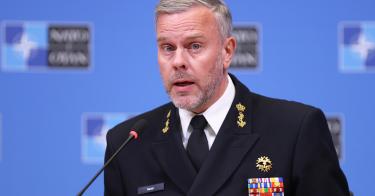Come July, in the shadow of war, NATO leaders will meet in Vilnius, Lithuania. Without question, they’ll be talking about the future of Ukraine. But while that’s important, what’s even more important is the future of the Western defense alliance itself.
One unmistakable lesson the Russian invasion has taught us is that the future is not war-free. To deter attacks against the trans-Atlantic community, effective collective security remains essential.
How NATO will deal with Ukraine is anybody’s guess. The alliance has repeatedly stated that the door to Ukrainian membership remains open, and President Biden and his fellow leaders should not waver from that principled stance.
NATO is an alliance of free nations. Neither Russian President Vladimir Putin nor anyone else can claim the right to veto the decisions of free nations.
>>> It’s Past Time To Counter the Growing Iran-Russia Axis
Countries apply to join the alliance by choice, and the member nations decide whether to accept them. While Kyiv is eager to join the alliance, it’s not clear that the alliance is ready to accept Ukraine. As with Ukraine‘s hopes to join the European Union, it remains to be seen how the membership process will unfold.
But the reality of war means the NATO nations can’t sit on their thumbs while the process plays out. It is in the West’s interest to see a free, stable, secure and prosperous Ukraine. Two tasks simply can’t wait.
One is security assistance. The U.S. and its allies must build up Ukraine‘s capacity for conventional self-defense over the long term. They must also develop a reconstruction program that helps make Ukraine a strong nation and not an economic weakling dependent on foreign aid.
It’s important that NATO take part in the security assistance mission as an alliance, rather than just rely on bilateral support where individual nations—the U.S. in particular—are expected to carry an unfair share of the burden.
Beyond that, NATO members must be prodded into building up their own conventional forces and defense industrial bases. To deter Mr. Putin further, NATO must be able to demonstrate that it can defend itself and lend material support to nonmember nations to help them repel Russian aggression that would threaten NATO security.
To that end, NATO‘s development of a family of regional defense plans could prove hugely important.
For one, the debate about burden-sharing often revolves around asking nations to “do more,” without defining what “more” means.
The regional plans should be the basis for national defense planning, so that countries have a measurable, outcome-oriented goal to determine not only what they need to defend themselves but also what they must contribute to the collective defense.
And that means not just building up their armed forces, but their industrial bases, logistical support systems, and stockpiles of munitions and spare parts as well.
>>> China’s Global Influence Game
In addition, NATO plans ought to be foundational to developing NATO exercises—putting into operation the training, actions, coordination and cooperation to test and demonstrate that the alliance can do what it says it can do on paper. Routine exercises are an important part of deterrence.
NATO must have adequate capacity and capability to protect our interests in the Atlantic community. A stronger NATO and a less U.S.-dependent Ukraine will allow the U.S. to turn its attention—and more of its conventional forces—to what should be its top priority: deterring China in the Indo-Pacific.
A secure Atlantic community is a critical part of meeting the China challenge. As a weaker Russia becomes China’s junior partner, it is more likely that Beijing will use Russia and European nations where it has influence to drive its agenda.
A strong NATO can serve as a bulwark against that influence. In addition, a strong NATO must reduce dependency on strategic supply chains dominated by China and insist members safeguard critical infrastructure from malicious Chinese influence operations and disruptive action.
This piece originally appeared in The Washington Times




